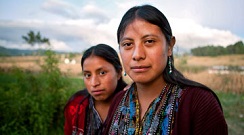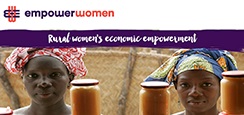Rural women
Rural women are key agents for achieving the transformational economic, environmental and social changes required for sustainable development. But limited access to credit, health care and education are among the many challenges they face, which are further aggravated by the global food and economic crises and climate change. Empowering them is key not only to the well-being of individuals, families and rural communities, but also to overall economic productivity, given women’s large presence in the agricultural workforce worldwide.
Our solutions
UN Women supports the leadership and participation of rural women in shaping laws, strategies, policies and programmes on all issues that affect their lives, including improved food and nutrition security, and better rural livelihoods. Training equips them with skills to pursue new livelihoods and adapt technology to their needs.
In India, with support from UN Women’s Fund for Gender Equality, the Dalit Women’s Livelihoods Accountability Initiative has helped women marginalized by the caste system engage in the Mahatma Gandhi National Rural Employment Guarantee scheme. Between 2009 and 2011, in eight districts, their participation grew from 2,800 to more than 14,000. Many Dalit women now have bank accounts in their names and are unionized to defend their rights.
In Zimbabwe, along one of the poorest stretches of the Zambezi River, new equipment and training offered by UN Women has helped women from the Tonga ethnic group break into the male-dominated fishing industry. Instead of selling fish purchased from men’s boats, they now market their own catch. Sales have doubled, and the women are organizing collectives, extending their market reach to larger towns and cities, and participating in a revolving fund providing small loans.
Women farmers typically have less access to irrigation technology. In China’s Ningxia Hui Autonomous Region, UN Women helped ensure that scores of women farmers are able to learn about, acquire and maintain advanced irrigation systems. Climate change has made the flow of local rivers, the traditional source of water, unpredictable. Many men have left their villages for jobs in cities, with women remaining behind to take up farming. To underscore new ways of thinking, local drama troupes have staged performances demonstrating the value of women’s participation in water management. Surveys have shown that local women, with their confidence bolstered by new skills and options, have become increasingly willing to voice their opinions in village affairs.
Important partners in our work with rural women include the Food and Agriculture Organization, the International Fund for Agricultural Development and the World Food Programme under the initiative “Accelerating Progress towards the Economic Empowerment of Rural Women.” It aims to empower rural women to claim their rights to land, leadership, opportunities and choices, and to participate in shaping laws, policies and programmes. Evidence shows that this spurs productivity gains, enhanced growth and improved development prospects for current and future generations. The initiative also engages with governments to develop and implement laws and policies that promote equal rights, opportunities and participation so that rural women can benefit from trade and finance, market their goods and make a strong contribution to inclusive economic growth.


